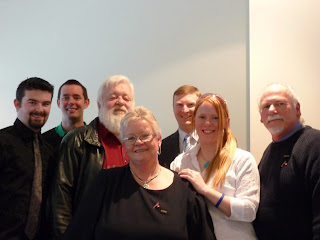There was a fair group from the Australian Skeptics there
 (From left to right) Me, Frode, Barry Williams, Margaret, John, Rachel and John.
(From left to right) Me, Frode, Barry Williams, Margaret, John, Rachel and John. (L to R) Margaret, John, Barry, Michael, Jason
(L to R) Margaret, John, Barry, Michael, JasonJohn Lennox was the first speaker. He argued using all of the same weak arguments that we've heard time and time again coming from the religious front, such as that science cannot deal with abstract concepts such as love, poetry, music; Darwinism implies atheism; atheism is a religion; atheism is a philosophy, not science, etc etc etc...

Lennox also posited that atheism and theism are worldviews and the question is with which of these science is closer related;
Christianity gave us science, therefore they must be inseparable;
the atheistic worldview tells us that consciousness is unguided, so why should we believe it?;
atheism undermines the basic rationality needed to explain science because information cannot be reduced to physics and chemistry.
He concluded with asserting that mind must precede matter, not matter before mind, and his closing statement was that either in the beginning were the particles and a cold process of gradual movement from simple to complex forms, or in the beginning was the word...
-------------------------------------------
Michael Shermer then took to the lectern. After a few jokes, including an anecdote about his past life as an evangelical door knocking christian which was followed by a period of militant atheism where he went around knocking on the same doors and taking it all back!
Shermer made the points that atheism only answers the question of belief in a god which makes no positive assertion about what an atheist believes. He also spoke about all of the other groups, such as agnostics, secular humanists, naturalists, brights etc that have tried to escape from the negative connotations associated with the term 'atheism'. He went on to explain that American religion is so virulent because of the separation of church and state, which means that the churches have to compete with each other for money, like businesses; and because of the poor social services by which religious groups are the safety net for those who don't get the care they need from the state, as happened during hurricane Katrina.

Shermer also spoke about the difference between a top-down or bottom-up view of nature. God represents a top-down process, whereas Darwin proposed a bottom-up process, the difference between them being the testability of their claims. Science and religion intersect where religion makes testable claims, which led to a discussion on the efficacy of prayer studies (1,2,3)
Shermer concluded by saying that even if there was evidence to support the existence of god, science would still want to know the process by which she stared it all off. There is nothing that intersects with the physical world that lies outside of the scope of science.
-------------------------------------------
There was then a break and Michael Shermer made a b-line for Rachel, remembering her from TAM (I didn't get recognised nearly as quickly, but then again, I'm not a pretty blonde!)

We had a chat with him and congratulated him on a great speech, before getting an obscene amount of photos. It was really good to see him, he is such a nice guy that has time for anyone who wants it. Before long, we were being called back to our seats for the QnA side of the luncheon.

The questions included "What about other gods?"
Shermer: The world of a deistic god is not as satisfying as a world where the god interacts in people's lives, so the theistic gods appeal to people much more than the deistic gods. The reason that these debates are about the judeo-christian god is that it is the god that our society mostly identifies as 'God'. It would be frivolous to debate the existence of a god that people don't believe in anymore.
Does god interact with the world and can we test it?
Lennox: The resurrection of Jesus Christ is history and enough to prove Christianity.
Has science buried god? Whatever the answer, who cares?
Shermer: The recent boon of interest in the subject of religious criticism shows that there are many people that seem to care.
Lennox: The question of if there is or is not a god has a huge significance either way. If atheism is true, no victim of terror will ever achieve justice.
---------------------------------------------
Concluding statements:
Shermer- If there is no god, justice must be carried out in the present. Furthermore, we need to concentrate on the present without wishful thinking of an afterlife for which there is no evidence. The naturalistic worldview gives much more importance to the here and now.
Lennox- Justice in this world is an important thing to have, but there is an ultimate justice that exists. If atheism is right, there is no hope of justice for so many people.
---------------------------------------------
Afterwards, we all mingled together. There were a few heated debates with Lennox and John Dixon

And a photo opportunity or two

(L to R) Margaret, John, John Lennox, Frode, Rachel, Me (Alan) and John.
And that was just the beginning... more posts coming soon!






